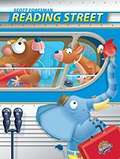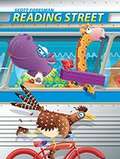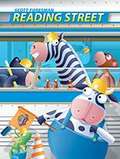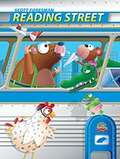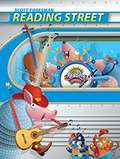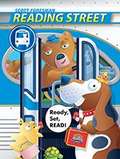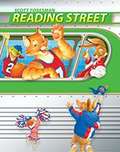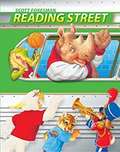- Table View
- List View
Reading Street [Grade 1, Unit 5]
by Candy Dawson Boyd Sharon Vaughn Camille Blachowicz Wendy Cheyney Connie Juel Edward Kame'Enui Donald Leu Jeanne Paratore Sam Sebesta Deborah Simmons Susan Watts-Taffe Karen Kring Wixson Peter Afflerbach P. David PearsonNIMAC-sourced textbook
Reading Street [Grade 1.1]
by Candy Dawson Boyd Sharon Vaughn Camille Blachowicz Connie Juel Edward Kame'Enui Donald Leu Sam Sebesta Deborah Simmons Karen Kring Wixson Peter Afflerbach P. David Pearson Jeanne R. Paratore Elena Izquierdo Alfred Tatum Susan Watts TaffeNIMAC-sourced textbook
Reading Street [Grade 1.2]
by Candy Dawson Boyd Sharon Vaughn Camille Blachowicz Connie Juel Edward Kame'Enui Donald Leu Sam Sebesta Deborah Simmons Karen Kring Wixson Peter Afflerbach P. David Pearson Jeanne R. Paratore Elena Izquierdo Alfred Tatum Susan Watts TaffeNIMAC-sourced textbook
Reading Street [Grade 1.2]
by Candy Dawson Boyd Camille Blachowicz Peter AfflerbachNIMAC-sourced textbook
Reading Street [Grade 1.3]
by Candy Dawson Boyd Sharon Vaughn Camille Blachowicz Connie Juel Edward Kame'Enui Donald Leu Sam Sebesta Deborah Simmons Karen Kring Wixson Peter Afflerbach P. David Pearson Jeanne R. Paratore Elena Izquierdo Alfred Tatum Susan Watts TaffeNIMAC-sourced textbook
Reading Street [Grade 1.4]
by Candy Dawson Boyd Sharon Vaughn Camille Blachowicz Connie Juel Edward Kame'Enui Donald Leu Sam Sebesta Deborah Simmons Karen Kring Wixson Peter Afflerbach P. David Pearson Jeanne R. Paratore Elena Izquierdo Alfred Tatum Susan Watts TaffeNIMAC-sourced textbook
Reading Street [Grade 1.5]
by Candy Dawson Boyd Sharon Vaughn Camille Blachowicz Connie Juel Edward Kame'Enui Donald Leu Sam Sebesta Deborah Simmons Karen Kring Wixson Peter Afflerbach P. David Pearson Jeanne R. Paratore Elena Izquierdo Alfred Tatum Susan Watts TaffeNIMAC-sourced textbook
Reading Street [Grade 1.R]
by Candy Dawson Boyd Sharon Vaughn Camille Blachowicz Connie Juel Edward Kame'Enui Donald Leu Sam Sebesta Deborah Simmons Karen Kring Wixson Peter Afflerbach P. David Pearson Jeanne R. Paratore Elena Izquierdo Alfred Tatum Susan Watts TaffeNIMAC-sourced textbook
Reading Street [Grade 2, Unit 1]
by Candy Dawson Boyd Sharon Vaughn Camille Blachowicz Wendy Cheyney Connie Juel Edward Kame'Enui Donald Leu Jeanne Paratore Sam Sebesta Deborah Simmons Susan Watts-Taffe Karen Kring Wixson Peter Afflerbach P. David PearsonNIMAC-sourced textbook
Reading Street [Grade 2, Unit 1]
by Candy Dawson Boyd Sharon Vaughn Camille Blachowicz Wendy Cheyney Connie Juel Edward Kame'Enui Donald Leu Jeanne Paratore Sam Sebesta Deborah Simmons Susan Watts-Taffe Karen Kring Wixson Peter Afflerbach P. David PearsonNIMAC-sourced textbook
Reading Street [Grade 2, Unit 1]
by Candy Dawson Boyd Sharon Vaughn Camille Blachowicz Wendy Cheyney Connie Juel Edward Kame'Enui Donald Leu Jeanne Paratore Sam Sebesta Deborah Simmons Susan Watts-Taffe Karen Kring Wixson Peter Afflerbach P. David PearsonNIMAC-sourced textbook
Reading Street [Grade 2, Unit 2]
by Candy Dawson Boyd Sharon Vaughn Camille Blachowicz Wendy Cheyney Connie Juel Edward Kame'Enui Donald Leu Jeanne Paratore Sam Sebesta Deborah Simmons Susan Watts-Taffe Karen Kring Wixson Peter Afflerbach P. David PearsonNIMAC-sourced textbook
Reading Street [Grade 2, Unit 2]
by Candy Dawson Boyd Sharon Vaughn Camille Blachowicz Wendy Cheyney Connie Juel Edward Kame'Enui Donald Leu Jeanne Paratore Sam Sebesta Deborah Simmons Susan Watts-Taffe Karen Kring Wixson Peter Afflerbach P. David PearsonNIMAC-sourced textbook
Reading Street [Grade 2, Unit 2]
by Candy Dawson Boyd Sharon Vaughn Camille Blachowicz Wendy Cheyney Connie Juel Edward Kame'Enui Donald Leu Jeanne Paratore Sam Sebesta Deborah Simmons Susan Watts-Taffe Karen Kring Wixson Peter Afflerbach P. David PearsonNIMAC-sourced textbook
Reading Street [Grade 2.1]
by Candy Dawson Boyd Sharon Vaughn Camille Blachowicz Connie Juel Edward Kame'Enui Donald Leu Sam Sebesta Deborah Simmons Karen Kring Wixson Peter Afflerbach P. David Pearson Jeanne R. Paratore Elena Izquierdo Alfred Tatum Susan Watts TaffeNIMAC-sourced textbook
Reading Street [Grade 2.1]
by Candy Dawson Boyd Sharon Vaughn Camille Blachowicz Connie Juel Edward Kame'Enui Donald Leu Sam Sebesta Deborah Simmons Karen Kring Wixson Peter Afflerbach P. David Pearson Jeanne R. Paratore Elena Izquierdo Alfred Tatum Susan Watts TaffeNIMAC-sourced textbook
Reading Street [Grade 2.1]
by Candy Dawson Boyd Sharon Vaughn Camille Blachowicz Connie Juel Edward Kame'Enui Donald Leu Sam Sebesta Deborah Simmons Karen Kring Wixson Peter Afflerbach P. David Pearson Jeanne R. Paratore Elena Izquierdo Alfred Tatum Susan Watts TaffeNIMAC-sourced textbook
Reading Street [Grade 2.1]
by Candy Dawson Boyd Sharon Vaughn Camille Blachowicz Wendy Cheyney Connie Juel Edward Kame'Enui Donald Leu Jeanne Paratore Sam Sebesta Deborah Simmons Susan Watts-Taffe Karen Kring Wixson Peter Afflerbach P. David PearsonNIMAC-sourced textbook
Reading Street [Grade 2.1]
by Candy Dawson Boyd Camille Blachowicz Peter AfflerbachNIMAC-sourced textbook
Reading Street [Grade 2.2]
by Candy Dawson Boyd Sharon Vaughn Camille Blachowicz Connie Juel Edward Kame'Enui Donald Leu Sam Sebesta Deborah Simmons Karen Kring Wixson Peter Afflerbach P. David Pearson Jeanne R. Paratore Elena Izquierdo Alfred Tatum Susan Watts TaffeNIMAC-sourced textbook
Reading Street [Grade 2.2]
by Candy Dawson Boyd Sharon Vaughn Camille Blachowicz Connie Juel Edward Kame'Enui Donald Leu Sam Sebesta Deborah Simmons Karen Kring Wixson Peter Afflerbach P. David Pearson Jeanne R. Paratore Elena Izquierdo Alfred Tatum Susan Watts TaffeNIMAC-sourced textbook
Reading Street [Grade 2.2]
by Candy Dawson Boyd Sharon Vaughn Camille Blachowicz Connie Juel Edward Kame'Enui Donald Leu Sam Sebesta Deborah Simmons Karen Kring Wixson Peter Afflerbach P. David Pearson Jeanne R. Paratore Elena Izquierdo Alfred Tatum Susan Watts TaffeNIMAC-sourced textbook
Reading Street [Grade 2.2]
by Candy Dawson Boyd Sharon Vaughn Camille Blachowicz Wendy Cheyney Connie Juel Edward Kame'Enui Donald Leu Jeanne Paratore Sam Sebesta Deborah Simmons Susan Watts-Taffe Karen Kring Wixson Peter Afflerbach P. David PearsonNIMAC-sourced textbook
Reading Street [Grade 2.2]
by Candy Dawson Boyd Camille Blachowicz Peter AfflerbachNIMAC-sourced textbook

